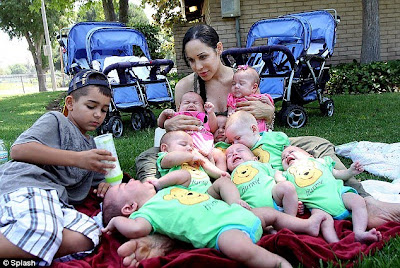Moral issues arise when patient autonomy conflicts with family interests. This generally occurs when the patient’s decision conflicts with what the family thinks is best. Conflicts can also occurs when the patient’s decision may not be in the best interest of his or her family, even though the family may not vocalize their disagreement. Patient autonomy grants patients’ the right to make their own medical decisions after having all information made available to them. In some cases, though, patients do not make decisions that doctors would deem most logical. Sometimes these decisions do not just affect the health of the patient, but also the well being of the patient’s family. Difficult cases like these force ethicists to question when it is appropriate and necessary for doctors to intervene.
Nadya Suleman started a media forest fire when she gave birth to octuplets in 2009. Her babies were born via IVF technology at the service of her doctor, Michael Kamrava. Controversy arose when the media publicized that Ms. Suleman was unmarried, had six other children, and was receiving welfare assistance. Many critics turned to Ms. Suleman who made a choice to have more children. Others, however, questioned her doctor for agreeing to Ms. Suleman’s request by providing IVF services. This case brought up the question of whether Ms. Suleman’s patient autonomy should have been more important than the interests of her family and own health.
When considering patient autonomy, it first is necessary to highlight that Ms. Suleman was a fully competent patient. She had received IVF treatment and had children before, so she was aware of the risk of multiple births pregnancy and the responsibilities of raising a child. A proponent of her patient autonomy could argue that Ms. Suleman’s own decision to have a child through IVF should be the only thing that matters in her doctor providing IVF services. While many criticize Dr. Kamrava’s decision to treat Ms. Suleman when she was a single mom and had six children, this criticism could be critiqued as very moralistic. As a doctor, his role is to provide his patients with medical services without judging their personal decisions and let that intervene with treatment. One could also argue that not providing Ms. Suleman with IVF treatments is a form of eugenics, because it claims that she should not have more children. Because she cannot get pregnant without IVF treatments, a eugenics argument could be used to claim that Dr. Kamrava refusing to treat Ms. Suleman is a form of him deciding she cannot have more children because of her socio-economic or marital status.
The interests of Ms. Suleman’s family and health arguably could be considered a higher priority than her patient autonomy. While it may have been Ms. Suleman’s choice to receive IVF treatments, critics argue that this was a bad choice and that Dr. Kamrava should have intervened by refusing to treat her. The nonmaleficence principle dominates this argument. Ms. Suleman had six embryos implanted in her, which far exceeds the recommended amount for IVF treatment. This arguably had the potential to cause great harm to her health and the health of the embryos because of the risks of multiple fetus pregnancies.
Another argument supports the idea that her having more children brings potential harm to the children she already has, as well as the new babies who will be born. The interests of the children were arguably compromised through this because now their parental attention and financial resources available to them are depleted more with eight new children. Ms. Suleman’s parents were also involved in the care of their grandchildren and disagreed with the availability of IVF treatments to their daughter, because of the harm caused to the family. One also could consider the financial harm and burden on the state, because Ms. Suleman cannot fully support herself and was relying on government assistance. All these arguments highlight potential harm that could be caused not to the patient, but to others as a result of both Ms. Suleman’s decision and Dr. Kamrava’s compliance.
In the case of Nadya Suleman, I think that the interests of her own health and family should were more important than the moral need for patient autonomy. Dr. Kamrava acted in a way that was medically and morally irresponsible. Ms. Suleman’s own health was compromised by implanting so many embryos and the harm to her family proves to be an issue financially. Ultimately, professionals agreed that Dr. Kamrava acted negligently and he lost both his California medical license and membership to the American Society for Reproductive Medicine. As a doctor, Dr. Kamrava should have stepped in and considered the moral consequences of his decisions, not just Ms. Suleman’s choice as his patient.